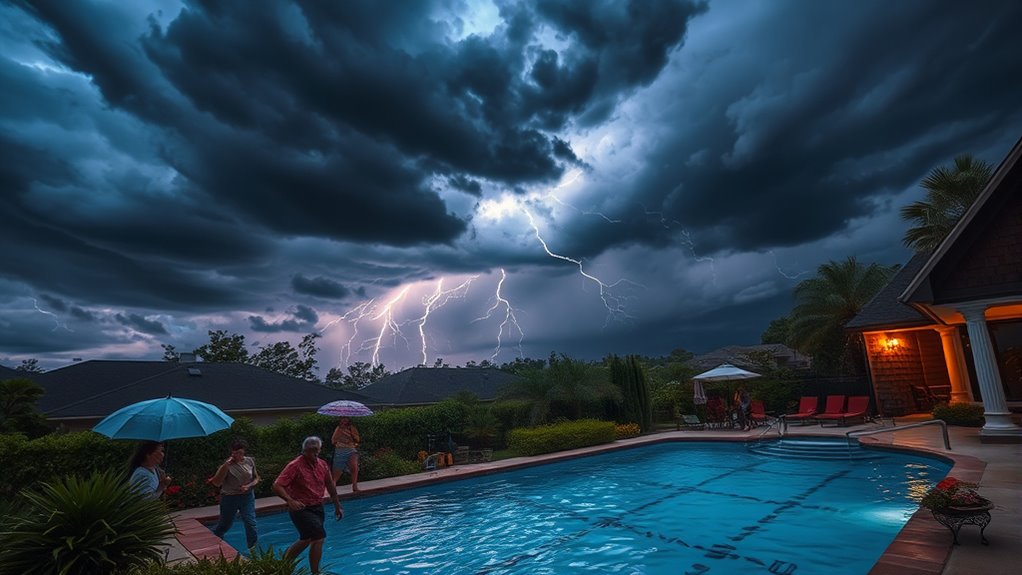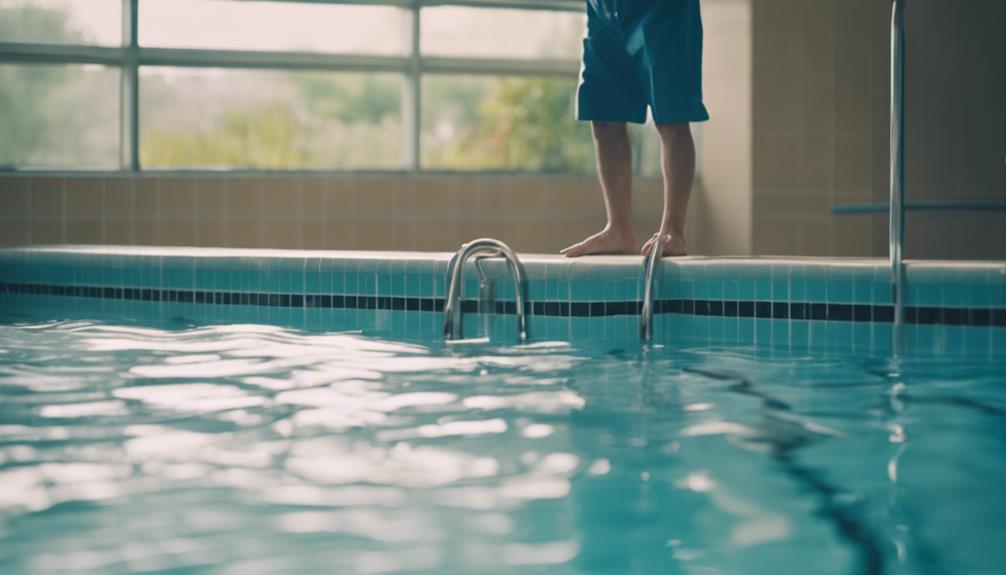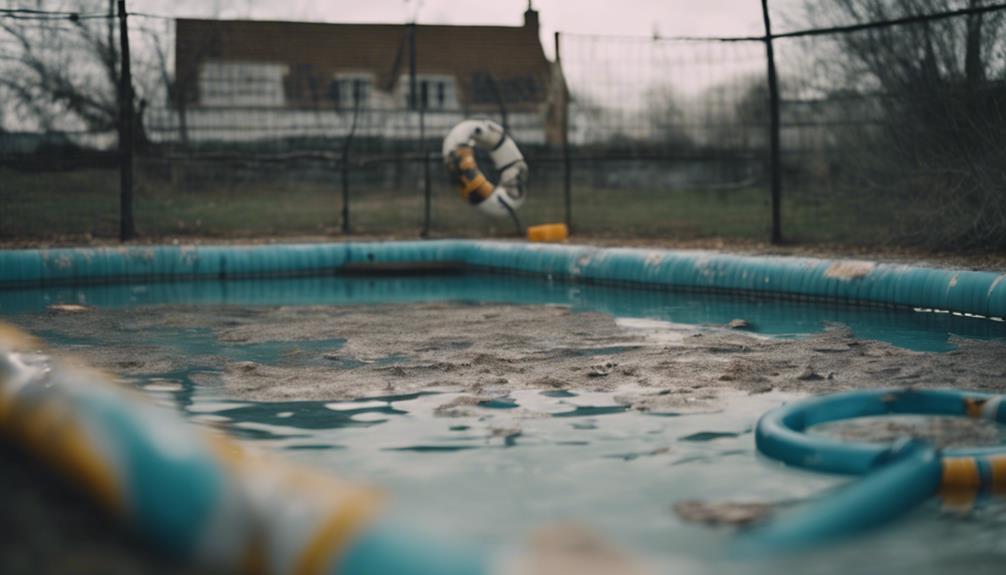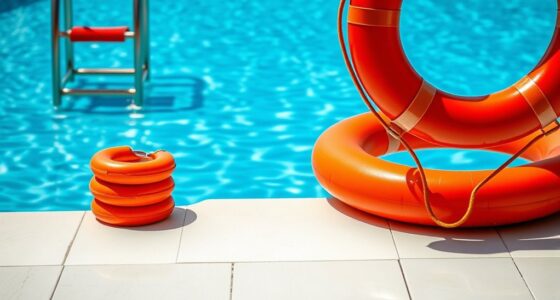If a thunderstorm occurs while you’re at the pool, immediately stop all activities and exit the water carefully. Seek shelter in a sturdy, enclosed structure that is grounded, avoiding open areas, trees, or open shelters. Stay away from electrical devices and unplug any equipment nearby. Remain in your safe spot until the storm passes and it’s confirmed safe to return. Following these steps helps prevent injuries and electrical hazards—keep going to learn more essential safety tips.
Key Takeaways
- Cease all pool activities immediately and leave the water upon detecting storm signs like dark clouds or thunder.
- Seek shelter in a grounded, enclosed structure away from electrical devices, trees, and open areas.
- Avoid sheltering under trees, open structures, fences, poles, or umbrellas during thunderstorms.
- Unplug electrical equipment, and stay away from electrical devices near the pool to prevent shocks.
- Remain in shelter until the storm passes and it is officially safe to return to the pool area.
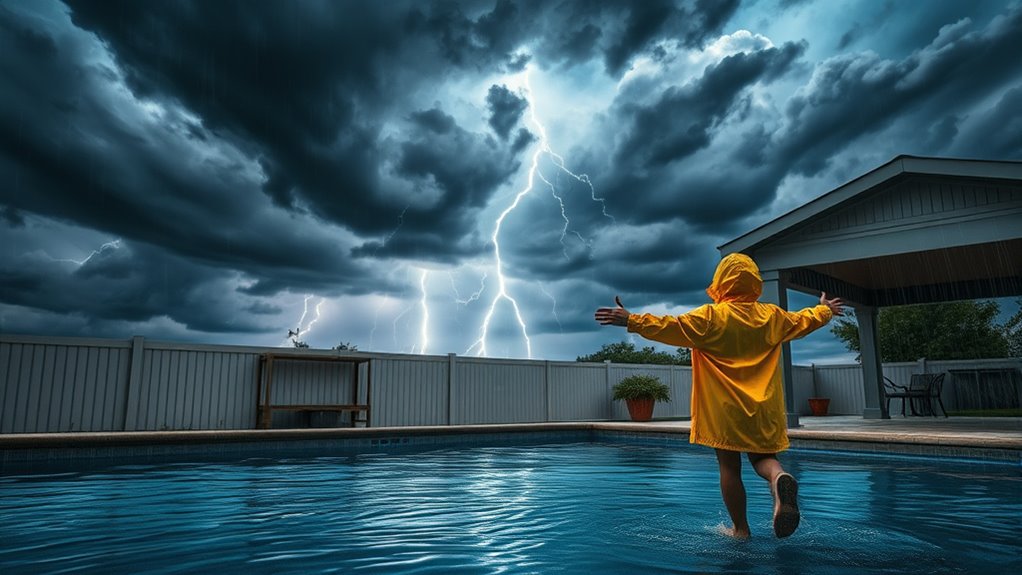
Storms can strike suddenly and cause significant damage, so knowing how to stay safe is essential. When you’re enjoying time at the pool, a thunderstorm can quickly turn dangerous if you’re not prepared. One of the biggest risks during a storm is electrical hazards. Lightning can strike nearby power lines or equipment, creating a deadly situation if you’re in or near water. Water is a good conductor of electricity, so even a distant lightning strike can cause electrical shocks or fires if proper precautions aren’t taken. That’s why it’s imperative to recognize the importance of pool sheltering during storms.
Storms pose electrical hazards; seek shelter immediately during thunderstorms at the pool.
If you see darkening clouds or hear thunder, you should immediately cease pool activities. Don’t wait for the storm to get closer; lightning can strike several miles away, and you might not see the danger until it’s too late. When it’s time to leave the water, do so quickly and carefully, avoiding any electrical devices or outlets near the pool area. If your home has a designated pool shelter, such as a sturdy, enclosed structure, head there promptly. Pool sheltering is the safest option because it provides a protected space that minimizes electrical hazards. Make sure the shelter is grounded and free of electrical appliances, which could attract lightning or cause shocks.
Never attempt to shelter under trees or near open structures. Lightning can strike tall objects, and being under a tree or in an open area increases your risk of injury. Also, avoid metal fences, poles, or umbrellas near the pool, as these can conduct electricity if lightning strikes nearby. During a storm, stay away from any electrical equipment, including pool pumps or filters, which can be damaged or become hazardous if lightning strikes or power surges occur. Unplugging these devices before the storm hits can help prevent electrical hazards and damage.
Once indoors or in a safe shelter, stay there until the storm passes and it’s declared safe to return outside. Keep a weather radio or a weather app handy for updates, and be alert to changing conditions. Remember, safety always comes first. By recognizing the dangers of electrical hazards and prioritizing pool sheltering, you protect yourself and others from potential injuries. Storms can be unpredictable, but with quick, informed actions, you can reduce your risk and keep everyone safe during your pool time. Being aware of industry trends and understanding how to respond effectively can make all the difference in staying safe during thunderstorms.
Frequently Asked Questions
Can Lightning Strike Water Far From the Storm?
Lightning water can strike far from the storm, as lightning tends to seek the shortest path to the ground, sometimes traveling miles away. This makes lightning safety essential even if the storm seems distant. Keep away from water during thunderstorms, because water is a good conductor. Remember, if you see lightning or hear thunder, it’s safest to get out of the water immediately and seek shelter to avoid the risk of lightning water strikes.
How Long Should I Wait After a Thunderstorm Before Swimming Again?
When a thunderstorm hits, it’s best to wait until the coast is clear. You should stay out of the water for at least 30 minutes after the last thunderclap. Keep an eye on weather monitoring updates and follow the pool closure signs. Remember, safety comes first—don’t rush back in too soon; better safe than sorry, as the saying goes. Wait until you’re sure it’s safe before swimming again.
Are Pool Heaters or Electrical Systems Safe During Storms?
During storms, electrical safety is vital, especially with pool heaters and electrical systems. You shouldn’t use or have your heater running during a thunderstorm, as lightning can cause electrical surges or damage. Regular heater maintenance helps prevent electrical issues, but it doesn’t make them safe during storms. Always turn off and unplug your pool heater and electrical equipment when a storm approaches to protect yourself and your system.
What Are Signs of an Impending Lightning Strike Near the Pool?
Did you know lightning strikes about 8 million times daily worldwide? When you’re near the pool, look for lightning warning signs like darkening skies, increased wind, or a sudden drop in temperature. Storm approaching cues include distant thunder or a flickering horizon. Recognizing these signs helps you act quickly, ensuring your safety. If you see these cues, leave the water immediately and seek shelter to avoid danger.
Is It Safe to Stay Poolside During a Thunderstorm?
Staying poolside during a thunderstorm isn’t safe. Lightning can strike suddenly, putting you at risk of serious injury or death. For proper poolside safety, you should leave the pool immediately and seek shelter indoors. Storm preparedness means monitoring weather alerts and avoiding water activities during storms. Remember, your safety depends on acting quickly and responsibly, so never ignore storm warnings when you’re near water.
Conclusion
So, next time lightning threatens your poolside paradise, remember: ignoring the storm is not a brilliant survival strategy. Pretend you’re a wise philosopher, not a reckless weekend warrior, and seek shelter immediately. After all, risking it all for a splash contest or tan might make for a funny story—or a very tragic one. Stay smart, stay safe, and leave the thunder to the sky’s dramatic performances. Your future self will thank you for it.

